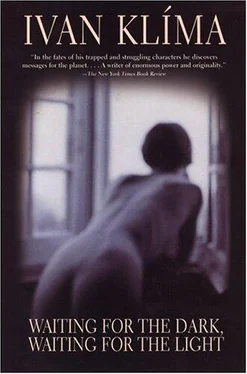listening to no one, knowing nothing, bowing to no one.
From a distance, rising out of the autumn mists, he saw the castle where Peter was in his tenth year as caretaker.
For the first few years after serving their sentences, they saw each other often. They took advantage of a political thaw and started studying for their degrees by correspondence. When they got their diplomas, Peter, unlike him, refused to accept a position from which someone had just been dismissed. His religious convictions had something to do with his decision, and so did Alice, who shared Peter's faith. So Peter worked for several years as a linoleum layer, then he took a job as caretaker of a castle. The castle was not far from the place where they had both once tried to cross the border.
Peter could certainly have found more demanding work than looking after a nationalized, aristocratic country seat. But he wasn't complaining. He let it be known that his work gave him intellectual independence, at least. Neither baroque art nor the ideas of that period excited anyone any more. He could have had complete peace and quiet had he not taken up activities that the current legal system had placed outside the law. Both Peter and Alice wanted to remain independent: to associate with people, read books and live as they saw fit.
In a small village grocery below the castle he bought five bottles of red wine (they only had one kind) and three bars of chocolate for the children. He would have liked to buy something nice for Alice, but there was nothing here he could give her as a present.
Approaching the castle gate, he was stopped by a sudden, constricting pain in his chest. He had to lean against the wall. He should drink less, stop smoking, try to live his life differently. His job in television was wearing him down — not the work itself, but the conditions in which he worked. But what would he do if he decided to quit? He could probably make a living as a street photographer, but the right time for that had long since passed. He should at least take a rest. But where, with whom and, in fact, why?
He rang the bell. A window over the vestibule opened, and dogs began barking inside. A surprised female voice
called out, 'Is that you, Pavel?'
'It's me, Alice, I was just passing by.'
The barking rapidly grew louder, then a key turned creakily in the lock. Two boxers burst through the door, jumped up on him and tried to lick his face.
'I just happened to be driving by,' he said.
'Where are you heading?' She was wearing a short skirt of printed cotton.
'I was on a shoot not far from here, in the chemical factory.'
'Way into the night?' she said, 'or right through till morning?'
'I suppose I do look pretty awful,' he admitted. 'I've been working like a dog recently, and I went on a bit of a bender.' He noticed that she too looked tired, perhaps even unhappy.
They walked together along a cold, gloomy corridor. Rust-stained engravings were hanging on the walls. She walked ahead of him. Her long legs had excited him the first time they met, and even after three children she remained slim, almost delicate. Her fair hair reached almost to her waist. Peter and he had met her together twenty years ago, when they were demonstrating against the invasion of their country by a foreign army. The foreign power had hypocritically presented its incursion as an act of assistance to help quell a non-existent enemy. They were standing near the radio building when they saw her, a girl in a short denim skirt and a boy's shirt, waving an enormous flag and shouting, along with others, the vain demand that the soldiers leave. Her eyes were dark blue. He'd never seen eyes of that colour before.
'They could start shooting any minute,' he had said to her.
'Why're you telling me this?' she said, 'I know it better than you do. They brought eight casualties in yesterday.'
They talked about those who had been shot, and about what would happen next. It went without saying that they were all prepared to take a stand, and even to die, but not a single shot was fired that day, and nothing happened to them.
Peter and he walked with Alice through the crowd and
down the square where years later, when he had learned to keep his own behaviour in close check, the demonstrators would gather again.
Strangers offered them refreshments, and they felt a special closeness that lifted them above the despair of the moment. That evening, they walked her home together. She lived in a hostel in the grounds of the hospital where she worked. They both kissed her goodnight. The kiss meant nothing, promised nothing. Still, he remembered it and he remembered her. He liked her looks and her personality. There was a warm-hearted openness in her behaviour, but beneath it he sensed hidden, impenetrable depths that drew him to her.
For a while they went out together, and he believed he loved her as much as she loved him. He was certain of this until something happened which, at the time, he thought far less a turning-point than she did. He preferred not to remember it now.
When they were going out together, Peter would often join them. They attended plays in small theatres or went to private screenings, which were a pleasure for Alice to watch and a duty for him.
He never stopped believing that Alice was more suited to him than to Peter, but later it became clear that she didn't think so. Or perhaps she sensed that Peter was more constant, more faithful and, most of all, more genuine. He missed his chance. Who might he have become had he been able to live by her side?
'Whether it was by accident or by design, I'm glad you stopped,' she said, smiling. She was always sweet to him, as though nothing had happened to sour their relationship.
They went up to the first floor.
'You'll have to wait a while for Peter,' she said. 'He's with an inspector from the centre. They're always nosing about. They'd love to find something wrong. Or at least to find something missing from the inventory. But they won't catch him out like that.'
'How will they catch him out?'
'They won't,' she said, and for a moment she looked almost annoyed. 'Peter respects the rules and only does
what's permitted. But as you well know, there are areas where almost everything is permitted.' Perhaps she suddenly regretted saying this because she added quickly: 'Even so, they won't leave him alone. Just last month they came to get him twice. They say they're from Criminal Investigations, but it's always the same people, the ones who are trying to drive us out of here.' As if trying to change the subject, she stopped in front of a door. 'Wait, let me show you something.' She unlocked the door, and he looked into a room containing several pieces of baroque furniture wrapped in sheets of translucent plastic. A fresco on one wall was disfigured by a layer of mould, and the parquet flooring was buckling in several places.
'They're trying to blame this on him too,' she said. 'At the end of the summer, a gale lifted off a piece of the roof, and we've been trying ever since to find someone to repair the hole. Peter covered it with tar-paper, but every time it rains the water gets in. It's a pity you're not a roofer. But maybe you can take a couple of pictures, and we'll send them to the ministry. Or you could make a film.'
'I doubt that they'd approve it.'
'I forgot, you have to have everything approved.'
'I can take some snapshots for you.'
He sat down in a chair facing the mouldy wall. The fresco depicted the birth of Venus. The goddess reminded him of the woman standing beside him, with long, golden hair tumbling down to her waist: he saw an infinite tenderness in both their faces. A big brown blotch was creeping down the wall, coming closer and closer to the goddess, threatening to swallow up her features.
Читать дальше











